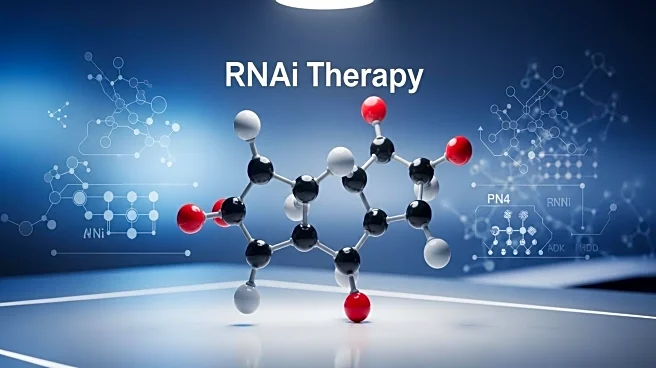What's Happening?
Arrowhead Pharmaceuticals has filed a request for regulatory clearance to initiate a Phase 1/2a clinical trial of ARO-DIMER-PA, an investigational RNA interference (RNAi) therapeutic. This drug is designed to treat atherosclerotic cardiovascular disease (ASCVD) due to mixed hyperlipidemia by silencing the expression of two genes, PCSK9 and APOC3, using Arrowhead's proprietary TRiMTM technology. The trial aims to evaluate the safety, tolerability, pharmacokinetics, and pharmacodynamics of ARO-DIMER-PA in up to 78 adult subjects with mixed hyperlipidemia. Mixed hyperlipidemia is characterized by elevated levels of LDL-C and triglycerides, posing a significant risk for ASCVD, the leading cause of mortality worldwide. Arrowhead's approach represents a significant advancement in RNAi therapeutics, targeting two genes simultaneously to potentially reduce residual ASCVD risk.
Why It's Important?
The development of ARO-DIMER-PA is significant as it addresses the substantial residual risk of ASCVD in patients with mixed hyperlipidemia, despite existing LDL-C-lowering therapies. By targeting both PCSK9 and APOC3 genes, Arrowhead's therapeutic could offer a more comprehensive approach to managing lipid levels, potentially reducing healthcare costs and improving patient outcomes. This advancement reinforces Arrowhead's leadership in the RNAi field and aligns with their strategic focus on cardiometabolic therapeutics. Successful clinical trials could pave the way for new treatments that significantly impact the management of cardiovascular diseases, benefiting patients and healthcare systems alike.
What's Next?
Pending regulatory clearance, Arrowhead plans to proceed with the Phase 1/2a clinical trial, which will be randomized, double-blind, placebo-controlled, and dose-escalating. The trial will assess the effects of single and multiple doses of ARO-DIMER-PA on LDL-C and triglyceride levels. Arrowhead is also anticipating a PDUFA date for another RNAi therapeutic, plozasiran, and is conducting a Phase 3 trial for zodasiran in homozygous familial hypercholesterolemia. These developments indicate a growing commercial focus on RNAi therapeutics, with potential market entry and expanded treatment options for cardiovascular diseases.
Beyond the Headlines
Arrowhead's innovative approach in RNAi therapeutics could lead to long-term shifts in how cardiovascular diseases are treated, emphasizing gene silencing as a viable strategy. The dual-targeting mechanism of ARO-DIMER-PA may set a precedent for future RNAi therapies, encouraging further research and development in this area. Ethical considerations regarding genetic interventions and their implications on healthcare practices may arise as these therapies become more prevalent.










